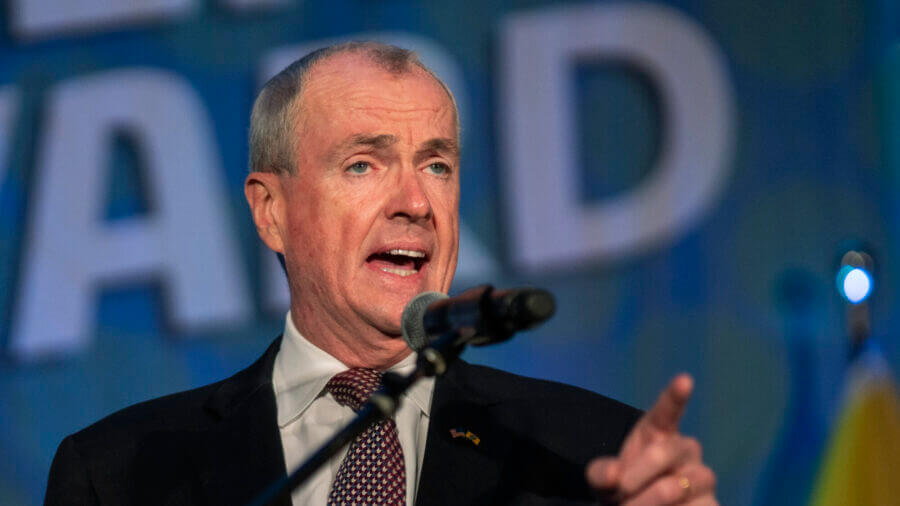New Jersey Governor Phil Murphy delivered a climate change address at Rutgers University in New Brunswick on Wednesday, Feb. 15, outlining various climate adaptation and mitigation efforts to aid the state’s aggressive fight against climate change.
“This is an administration that has taken the view that it is more important to do things that will better protect our communities from worsening climate impacts while building opportunity for all in our burgeoning clean energy economy, leaving the next generation of New Jerseyans better than the past one left us,” explained Murphy, who went on to describe six pillars that will serve as the foundation of his administration’s new climate action plan.
The first and most notable was the acceleration of New Jersey’s 100 percent clean energy goal, which requires all of the electricity sold in the state to come from clean sources of electricity by Jan. 1, 2035 through clean energy market mechanisms. This target had previously been set for 2050. In last week’s climate address, Murphy moved it ahead by 15 years to 2035.
“The short timeline puts us on par with California, and you’d like to think New Jersey is as good as California,” explained Catherine Duckett, Ph.D., Associate Dean of the School of Science. “The faster we adjust to a clean economy, the less pain there’s going to be. How long did it take for us to go into lockdown over COVID? If we want to solve climate change, we will. We can do it, but we have to say that we want to. I’m proud that Phil Murphy wants to.”
In 2018, Murphy’s administration enacted the Renewable Portfolio Standard to diversify and advance New Jersey’s clean energy portfolio by requiring that a certain percentage of energy sold come from qualified renewable energy sources. Upgrading this to a Clean Energy Standard further supports the development of clean energy and helps drive down their cost to consumers.
As Murphy noted, homes and businesses are the second-largest producers of greenhouse gas emissions in New Jersey due to their use of fossil fuels for heat. Accordingly, the second pillar outlined in the address tackled this issue with an executive order to install zero-carbon emission space heating and cooling systems in 400,000 homes and 20,000 commercial properties as well as making 10 percent of all low-to-moderate income properties electrification-ready by 2030.
The third pillar looked at the future of natural gas utilities as New Jersey attempts to reduce its reliance on fossil fuels, addressing what the future of the energy industry might look like and ensuring that those currently working in the field will still have jobs through an executive order to engage with stakeholders across energy, labor, and environmental industries.
While buildings serve as the second leading emitter of greenhouse gasses in New Jersey, vehicles are the first. Murphy announced the start of the stakeholder process to pursue the Advanced Clean Cars II rule, which would require all new cars and light-duty trucks sold in New Jersey to be zero-emissions vehicles by 2035.
In order to aid this process, Murphy also described plans to allocate $70 million of New Jersey’s proceeds through the Regional Greenhouse Gas Initiative toward lowering upfront costs of electric vehicles and the associated charging infrastructure.
“Focusing on the top two sources of greenhouse gas, transportation and buildings, is a smart move,” said Duckett. “New Jersey has some serious environmental justice issues. The electrification of cars and light-trucks and the electrification of new housing stock is very important.”
“I think the problem is going to be the secondary market with used vehicles,” pointed out Scott Jeffrey, Ph.D., Associate Professor of Management and Leadership. “You can say that all new vehicles sold will be electric, but it’s hard to say that there will be all electric on the road given the secondary market. It would be nice, but we still have a significant number of older cars out there.”
Finally, Murphy addressed the prevalence of sea level rise in coastal New Jersey communities and announced plans to enact flood resilience planning and better account for rising sea levels in coastal flood zone requirements.
“New Jersey is one of the areas of the world that is going to disproportionately suffer,” noted Duckett, citing sea level rise and increased flooding from storm events as major problems for the state’s coastal communities.
Despite the widespread acceptance of climate change and knowledge of its negative effects on New Jersey in particular, Murphy’s proposed climate actions have faced heavy criticism due to their short time frame, speculative cost to consumers, and overall impact on the state economy.
“They’re thinking about moving people out of the fossil fuel industry and into green energy jobs, but what do you do with those largely unskilled employees who are pumping gas? You have to do something with them,” said Jeffrey.
Still, others are more hopeful about the governor’s plans: “It’s likely that the state economy will grow due to it being a pioneer in adapting green energy, alongside the potential for hydroelectric and wind energy due to New Jersey’s geography,” speculated Richard Pitts, a junior political science student. “The transition to clean energy and the dissolution of fossil fuel plants will also aid in reviving New Jersey’s cities, and cleanup efforts will make previously empty and polluted lots more attractive alongside helping to raise property values.”
“Funding is a common refrain of the climate deniers. They question where the money is going to come from, but the money is there. Green energy is cheaper than fossil fuels so when you hear that we don’t have the money for it, that’s not an argument. Of course, we have the money for it, we don’t have the money to not do it. If you look at the subsidies that go to fossil fuel industries, they’re huge. Why are we giving all that money to those industries that are basically killing us? Turn those subsidies off and there’s your money.”
“Solving climate change is cheaper than suffering from it. We either pay now, or we pay later,” concluded Duckett.



